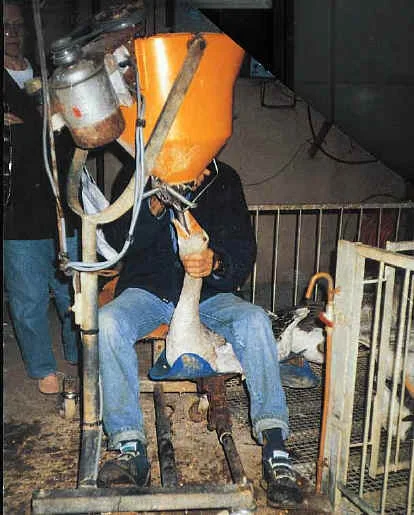Foie Gras | Two Sides of the Same Story | Roger Moore vs Anthony Bourdain
/Former 007 actor Roger Moore has succeeded in his PETA campaign to persuade Selfridges to stop selling foie gras. The campaign is a twist for PETA, which typically relies on more controversial tactics to spread their messages.
In the case of foie gras, perhaps the video says it all. No naked ladies are required to force Selfridges and Brits to acknowledge the inhumanity of eating foie gras … if the story is true, that the force-feeding process is totally inhumane.
There is debate around the facts of foie gras force feeding.
“Force-Feeding Birds Is Cruel, Not Yule,” reads the ad which has been devised by campaign group People for the Ethical Treatment of Animals (Peta). “Torture in a tin” sums up the ad strategy.
To deliver the foie gras delicacy on human dinner plates, birds are force-fed swollen grain, usually maize, over an 18-day period, with a long metal tube down their throats. About 4 pounds of grain mixed with fat are pumped into the birds’ stomachs two or three times daily.
The fowls’ livers are swollen to 10 times their normal size, making them ready for human consumption. It seems that both sides agree with the facts of the process.
Think of foie gras as food waterboarding for fowl, although the vet in Anthony Bourdain’s video, says that we’re erroneously applying human physiology to duck and goose gullets. With diagrams and scientific explanations of duck physiology, Bourdain says that PETA is misleading the public.
The first video is PETA’s presentation of why foie gras is inhumane and why ducks and geese are just like us.
Listening to the words of the PETA, the humanization of the animals is unnoticeable. There are many claims about the fowl which might be disputed by animal researchers. The movie speaks to duck personalities and individual duck motivations about the desire to live a good life, metaphorically-speaking.
As each of us establishes our relationship with the food we eat, we must ask ourselves if our actions are reasonable and ethical. This is a good trend that demands response from thinking people.
Having lived with abortion-rights activists much of my life, I’m sensitive to the process of using emotion, not science, to humanize an argument.
The second video is chef Anthony Bourdain’s, produced at Hudson Valley Foie Gras, a purveyor of gourmet delicacies for New York’s finest restaurants. The process is explained in a different perspective, arguing that the force-feeding process is ethical and not unusually cruel to the birds.
You decide.
My focus in the growing number of animal rights issues discussed at A of C, is that we create conscious linkage and deliberate action around the food we eat. Personally, I draw the line at monkey brains and whale meat, a short, personal story that’s moved into a top read.
Like many of you, I’m wading through the facts of the rest of my eating philosophy, in an effort to be mindful and know the big picture about how food makes its way into my mouth.
Roger Moore says “Don’t Eat Foie Gras”
Anthony Bourdain on No Reservations, Foie Gras Not Cruel
In a twist of strategy that I appreciate, Roger Moore offered to buy up the entire foie gras inventory at Selfridges, but it wasn’t necessary. Foie gras is off sale at Selfridges.
Roger Moore has become well known for his humanitarian work, most notably through his activities as a UNICEF Goodwill Ambassador, helping to raise funds for under-privileged children since 1991. Anne


